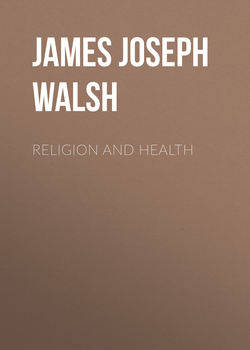Religion And Health

Реклама. ООО «ЛитРес», ИНН: 7719571260.
Оглавление
James Joseph Walsh. Religion And Health
INTRODUCTION
CHAPTER I. CAN WE STILL BELIEVE?
CHAPTER II. PRAYER
CHAPTER III. SACRIFICE
CHAPTER IV. CHARITY
CHAPTER V. FASTING AND ABSTINENCE
CHAPTER VI. HOLYDAYS AND HOLIDAYS
CHAPTER VII. RECREATION AND DISSIPATION
CHAPTER VIII. MORTIFICATION
CHAPTER IX. EXCESSES
CHAPTER X. PURITY
CHAPTER XI. INSANITY
CHAPTER XII. NERVOUS DISEASE
CHAPTER XIII. DREADS
CHAPTER XIV. SUFFERING
CHAPTER XV. PAIN
CHAPTER XVI. SUICIDE AND HOMICIDE
CHAPTER XVII. LONGEVITY
CHAPTER XVIII. THE BIBLE AND HEALTH
CHAPTER XIX. HEALTH AND RELIGION18
Отрывок из книги
There is no doubt that man's quite instinctive attitude toward the mystery which surrounds him, out of which he came and into which he goes, has always so influenced his attitude of mind toward his body and its processes as to affect them deeply. The medicine man with his appeal to the religious as well as the superstitious feelings of man always had a potent influence over the most primitive of mankind, but culture has not obliterated this source of special reaction in men. Even now, for the great majority of men it still remains true that no matter how vague their religious instinct may be, it continues to affect, to a notable extent, their physiological and psychological functions. An eclipse of the religious instinct is at the basis of the increase in suicide and also undoubtedly of insanity in our day. The lack of an abiding faith in Providence is the source of many dreads and worries that affect health. Every physician is sure to know of highly educated patients whose ills reflect their mental relation to the mystery of life and whose symptoms take on or lose significance, according to their religious feelings.
The question that in our time, however, is coming insistently into a great many minds is, Can we, as intelligent human beings, reasonably in touch with man's recent progress in science, be fair with ourselves and still continue to believe in the great religious truths that affected our ancestors so deeply? While we may realize all the depth of the mystery in the midst of which we are, can we, with our little minds, hope to fathom any of it? This is the questioning feeling that will not down for a certain number of those who have had educational advantages. Must we not just confess our inability to, know anything definite in reality with regard to it, and feel that those who have thought that they held the key of the mystery were deluding themselves or allowing themselves to be caught by pseudo-knowledge, an inheritance from unthinking generations, instead of realities?
.....
Ohm, after whom another of the units of electricity is named, was another of the scientists who realized very clearly the existence of Providence and in one very disappointing circumstance in life, when he found that some of his work at which he had spent much time was completely anticipated by a Norwegian investigator, he said very simply, "Man proposes but God disposes"; and he chronicled the fact that without the bait of this discovery which he vaguely foresaw at the beginning he would not have taken up the work, and yet during the time when he was at it "A number of things of which I had no hint at all at the beginning of my researches have come to take the place of my original purpose and compensate for it." When he undertook his next work he foresaw that he might not be able to finish it; he had hoped against hope that he would, and in the preface to the first volume he declared that he would devote himself to it at every possible opportunity and that he hoped and prayed that "God would spare him to complete it." This simplicity of confidence in the Almighty is indeed a striking characteristic of the man of whose discovery of the law of electricity Lord Kelvin declared that it was such an extremely simple expression of a great truth that its significance is probably not confined to that department of physical phenomena, but it is a law of nature in some much broader way. Professor George Chrystal of Edinburgh in his article on electricity in the "Encyclopaedia Britannica" (IX Edition) says that Ohm's law must now be allowed to rank with the law of gravitation and the elementary laws of statical electricity as a law of nature in the strictest sense.
Volta, whom the international congress of electricity so deservedly honored by giving his name to one of the units of electricity, is the genius who first constructed an instrument which would give a continuous flow of electricity. The Voltaic pile is a very great invention. Volta was much more, however, than merely an ingenious inventor. He was a great scientist who made discoveries not only in electricity but in various other branches of physical science. He was one of the eight foreign members of the French Institute, Knight Commander of the Legion of Honor, one of the first members of the Italian Academy and the gold medalist of the French Academy. There was nothing he touched in his work that he did not illuminate.
.....